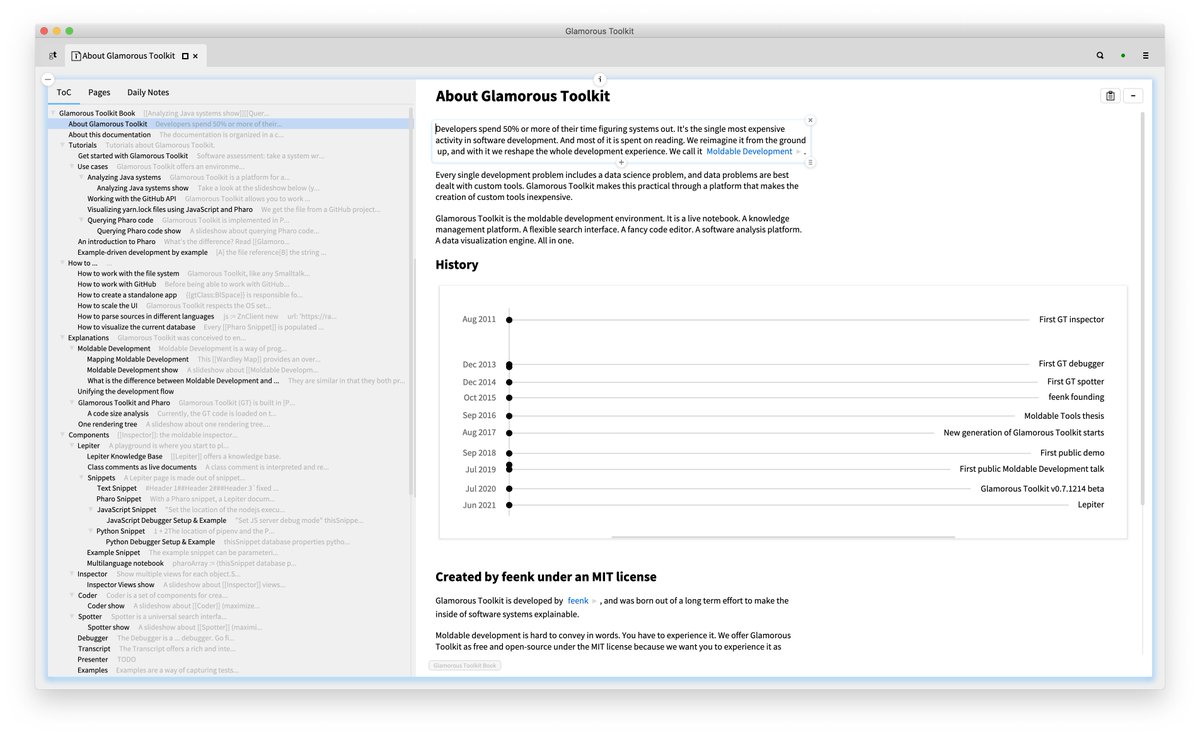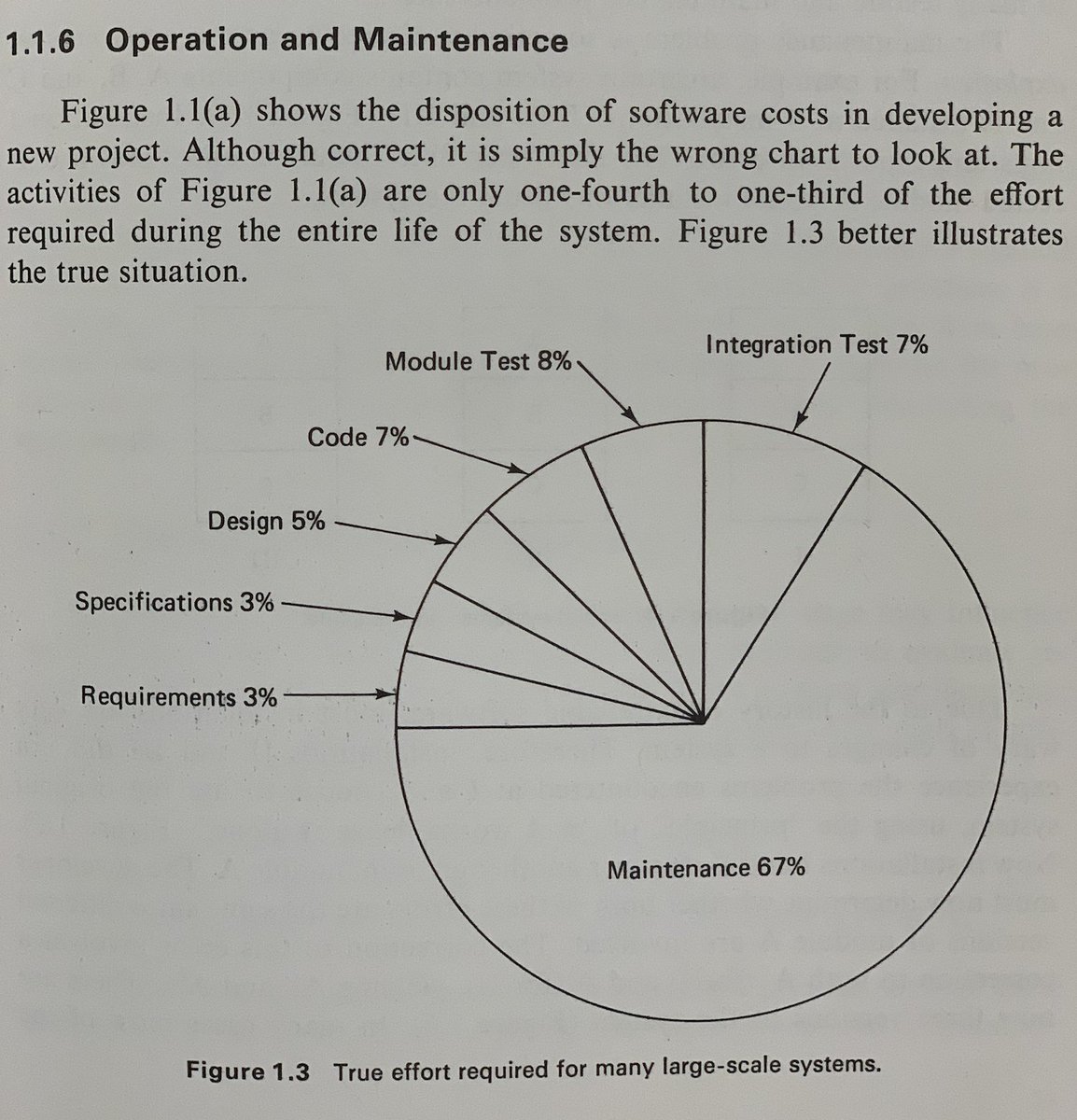Discover and read the best of Twitter Threads about #gtoolkit
Most recents (11)
This article 👇 offers an introduction to #MoldableDevelopment.
It's written for a first time reader. It's not quite short, but it's not that long either (~4000 words). It has concrete examples, but also a little broader theory.
1/
It's written for a first time reader. It's not quite short, but it's not that long either (~4000 words). It has concrete examples, but also a little broader theory.
1/
It starts from the reading problem: reading accounts for the single largest expense in software development today, but it's just a strategy to gather information from the system. We can automate much of it, but we should do it through custom tools.
2/
2/
A case study of #MoldableDevelopment:
A while back we implemented the squarified treemap algorithm in #GToolkit.
The implementation is based on a paper written by Bruls, @mackees and van Wijk in 2000 that describes a heuristics-based algorithm.
1/
A while back we implemented the squarified treemap algorithm in #GToolkit.
The implementation is based on a paper written by Bruls, @mackees and van Wijk in 2000 that describes a heuristics-based algorithm.
1/

The paper describes the algorithm in detail, and most of the explanations are based on visual depictions.
Here is a visualization showing the core iterative steps taken by the algorithm.
2/
Here is a visualization showing the core iterative steps taken by the algorithm.
2/

Of course, the main goal of implementing an algorithm like this is to produce the final picture. Here is how such a result looks like in #GToolkit.
3/
3/

"Everyone in the team should know the vision. Including the technical people." Sure, says everybody.
"Everyone in the team should know how the implementation. Including the non-technical people." What?!
Yep.
Let me take you on a ride.
1/
"Everyone in the team should know how the implementation. Including the non-technical people." What?!
Yep.
Let me take you on a ride.
1/
Last year we shipped a first version of #Lepiter and it felt great to see it flying out the door:
Lepiter is the latest significant step in our journey to making systems explainable. Here is a behind the scene peak of how we got here.
1/
Lepiter is the latest significant step in our journey to making systems explainable. Here is a behind the scene peak of how we got here.
1/
Our guiding north star @feenkcom is making the inside of systems explainable. We spent a great deal of energy rethinking how we can figure systems out, and this led to #MoldableDevelopment and #GToolkit.
2/
2/
#GToolkit proposes a new development experience. We see the environment as a language made out of visual and interactive operators that can be combined in many ways while working with the environment.
3/
3/
The recent conversations about #ToolsForThought tend to revolve around note taking. Indeed, a note can be a representation of thought...
2/
2/
But, a tweet can also be a representation of thought.
3/
3/
The talk consisted mostly of two stories. Two examples.
I started with a little story inspired by our recent experience of going through the Open edX system.
2/
I started with a little story inspired by our recent experience of going through the Open edX system.
2/
#GToolkit now features a new component: #Lepiter.
Knowledge Management + Multilanguage Notebooks + Moldable Development.
Let's take a tour.
1/
Knowledge Management + Multilanguage Notebooks + Moldable Development.
Let's take a tour.
1/
#MoldableDevelopment is a way of programming through which you construct custom tools for each problem.
What does that mean exactly?
Where does it come from?
Why is it relevant?
Read on.
1/
What does that mean exactly?
Where does it come from?
Why is it relevant?
Read on.
1/
The original idea of #MoldableDevelopment came from the work on Humane Assessment through which I argued that we need custom tools to reason about software systems effectively.
2/
2/
The idea of custom tools is a significant departure from the typical software engineering canons which often argue the opposite.
Still, it is relevant because it tackles the single largest expense in software development: figuring the system out.
3/
Still, it is relevant because it tackles the single largest expense in software development: figuring the system out.
3/
The monolith vs microservices debate…
By now there is plenty of evidence that both architectures can lead to a “mess”. This only shows that we should not look at these as mechanisms for controlling the said mess” in the first place.
The answer lies somewhere else.
1/
By now there is plenty of evidence that both architectures can lead to a “mess”. This only shows that we should not look at these as mechanisms for controlling the said mess” in the first place.
The answer lies somewhere else.
1/
“It’s the people!”
Well, as long as it’s people building the system, of course it’s the people. But, saying that does not get us closer to figuring a way forward though.
2/
Well, as long as it’s people building the system, of course it’s the people. But, saying that does not get us closer to figuring a way forward though.
2/
Now, what exactly does “mess” mean? The famous spaghetti code?
Mess tends to assume that there is a clean way. And by clean, people typically mean easy to understand and change.
3/
Mess tends to assume that there is a clean way. And by clean, people typically mean easy to understand and change.
3/
“Developers spend most of their time figuring the system out."
Let’s dissect this a little.
🧵
1/
Let’s dissect this a little.
🧵
1/
Accidentally stayed up until 7am on a videocall with @girba learning about Pharoah Smalltalk and #gtoolkit
Have not been this excited about a new programming paradigm since I learned Clojure.
Amazing amazing tool they have, with almost no on-boarding yet.
Just how I like it!!
Have not been this excited about a new programming paradigm since I learned Clojure.
Amazing amazing tool they have, with almost no on-boarding yet.
Just how I like it!!
Something always felt really wrong about Object Oriented Programming, @girba finally gave me words for it.
Asked him "what's missing from ruby/java, that you have in Smalltalk?"
The environment
Take a living language and put it in dead text files.
Worst possible experience.
Asked him "what's missing from ruby/java, that you have in Smalltalk?"
The environment
Take a living language and put it in dead text files.
Worst possible experience.
Finally have justification for my rants on OOP in this thread









